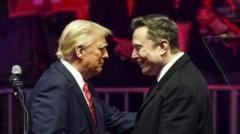Elon Musk has quickly established himself as a key player in the early days of Donald Trump's second administration, taking control of the newly created Department of Government Efficiency (Doge). With the world's wealthiest individual now at the helm of significant government reform, questions arise about his unorthodox methods and their implications for the federal framework.
Musk, who humorously referred to himself as “Tech Support” on X, has initiated several sweeping changes since assuming his position. He has seized control of the federal payment system, dismantled an agency entirely, and issued stark warnings to civil servants—quit or face termination. Critics are apprehensive about Musk’s aggressive tactics mirroring his corporate takeover style, a method that some believe may destabilize well-established governmental norms.
Historically, Musk identified more with the Democratic Party but shifted allegiances after growing disillusioned with President Biden's policies. Initially advocating for Governor Ron DeSantis, Musk has since become a formidable supporter of Trump, significantly influencing the administration's direction through financial contributions and advice.
Following the inauguration, Trump appointed Musk to lead Doge, allowing him to enact reforms at a rapid pace. Musk's penetration into government operations is not merely confined to policy; reports reveal he has even moved a portion of his team into the federal personnel office adjacent to the White House, further blurring lines between private and public sector operations.
USAID, the agency responsible for international development, has felt the brunt of Musk's reforms. Following a drastic reduction of functions and a public smear of the agency as a "criminal organization," USAID employees have experienced mounting distress. Several have been placed on administrative leave amid confusion over their future roles, raising legality concerns regarding Musk’s authority to overhaul an independent agency established by Congress.
The situation underscores a significant divergence in approach to governance. Prominent voices within both Democratic and Republican circles have expressed apprehension regarding Musk's sway and whether the reshaping of USAID is in violation of established congressional mandates. Some, like Senator James Risch, have voiced support for potential reforms driven by the current administration.
While some tech leaders hoped that Musk’s entrepreneurial spirit would transform Washington positively, the reality appears more tumultuous, leaving many in the tech industry unsettled. As fierce debates on governance continue, opinions on Musk’s expanding influence show stark contrasts, with some praising his ability to drive efficiency and others cautioning against destabilizing institutional integrity.
In the coming days, the balance of power between Musk and Trump will likely undergo scrutiny. Observers are speculating about potential clashes, as Musk’s ambition may challenge the boundaries established by experienced public leaders. With Musk stating authority remains with Trump, the dynamics of governance in this unprecedented administration are sure to evolve as the two powerful personalities navigate their alliance.



















